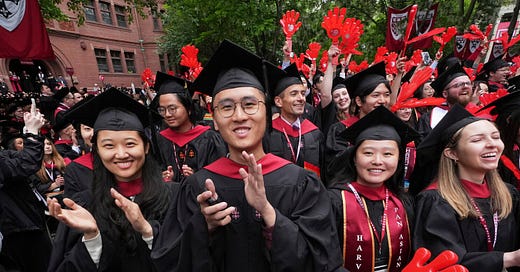Today, we publish a newsletter from Eduardo Remolins (info@eduardoremolins.com) because it shows that we are on the right track when offering students the possibility to prepare for life after university.
“The Harvard MBA is one of the most coveted degrees in the world. As an old classmate used to say, “It's like buying your life.”
Not anymore, it seems.
Read carefully because this affects you, and a lot.
In the US, they measure millions of things. One of those things is how many Harvard MBA graduates did NOT receive a job offer within three months of graduation.
The fact that this is measured gives you an idea of how confident they are. You graduate and offers pour in within weeks.
Okay. What is that number?
In 2021, 4%.
Four percent of graduates had not received a job offer three months after graduating.
But here's the interesting part: in 2024, that number (almost) quadrupled. It went from 4% to 15%.
In other words, one in six (6.6) were not even offered a glass of water (after three months, sure, but this is Harvard, and you have to be picky!).
Conclusion: with a Harvard MBA, you're buying less and less of a life.
And pay attention, it's not just Harvard. The same thing is happening at Yale, Stanford, MIT, etc. And the trend is growing.
Their graduates are finding it increasingly difficult to enter the job market.
What is changing so quickly that credentials that once guaranteed access to dream jobs are now obsolete?
Two letters: AI.
That's what's happening.
It's turning everything upside down. And it affects you, for sure.
Listen to these two things:
First: it's already clear that work is no longer a vertical, structured, and relatively predictable path as it used to be.
Why? Partly because AI is automating many entry-level functions.
It can perform very well the functions that were typically done by a newly hired employee. An “entry level” employee.
What companies used to do was recruit young graduates (if they could afford it, from elite universities) and train them in a gradual and relatively long career path.
But fewer and fewer companies are doing that now.
They need less and less “training from scratch” and more results from day one.
And if that's the case with Harvard or MIT MBAs, imagine what's happening with the rest.
But, but, but...
Second: AI opens up opportunities to develop your career from the start that didn't exist before.
It's like saying, “This path is going to get harder and harder... but I have these other options.”
It's like that old saying: “When one door closes, another one opens.”












Share this post